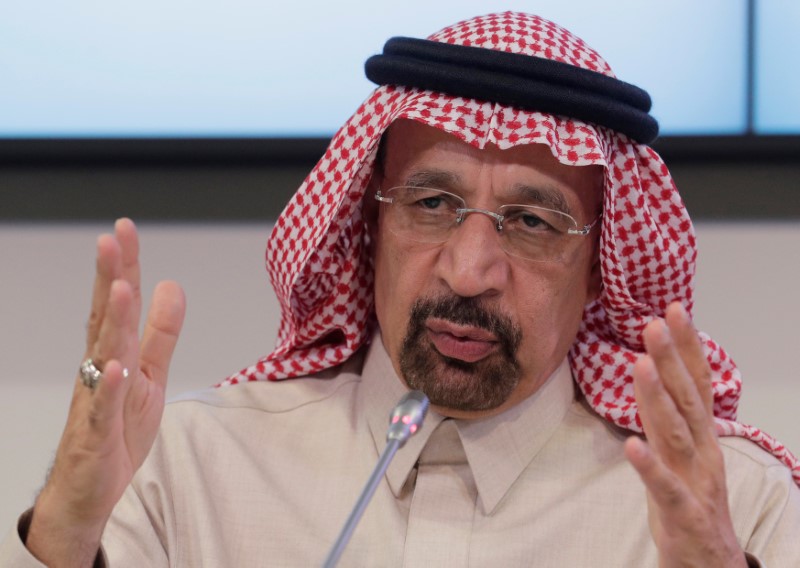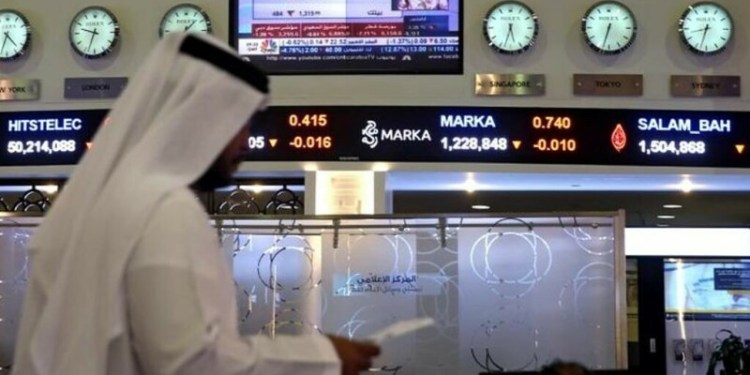 © Reuters. Saudi Arabia’s Oil Minister al-Falih addresses a news conference after an OPEC meeting in Vienna
© Reuters. Saudi Arabia’s Oil Minister al-Falih addresses a news conference after an OPEC meeting in ViennaBy Rania El Gamal and Maha El Dahan
MUSCAT (Reuters) – Saudi Arabia’s energy minister urged global oil producing nations on Sunday to extend their cooperation beyond 2018, but said this might mean a new form of deal rather than continuing the same supply cuts that have boosted prices in recent months.
It was the first time that Saudi Arabia had publicly raised the possibility of a new form of coordination among oil producers after 2018. Their agreement on supply cuts, originally launched last January, is due to expire in December this year.
Khalid al-Falih, speaking to reporters ahead of a meeting later in the day of the joint ministerial committee which oversees implementation of the cuts, said extending cooperation would convince the world that coordination among producers was “here to stay”.
“We shouldn’t limit our efforts to 2018 – we need to be talking about a longer framework of cooperation,” Falih said. “I am talking about extending the framework that we started, which is the declaration of cooperation, beyond 2018.
“This doesn’t necessarily mean sticking barrel by barrel to the same limits or cuts, or production targets country by country that we signed up to in 2016, but assuring stakeholders, investors, consumers and the global community that this is something that is here to stay. And we are going to work together.”
Falih said the global economy had strengthened while supply cuts – in which Saudi Arabia has shouldered by far the largest burden – had shrunk oil inventories around the world. As a result, the oil market will return to balance in 2018, he said.
But he said producers still had a lot of hard work ahead to restore the market to health, and it was unlikely to reach balance by the middle of this year.
Falih and energy ministers from the United Arab Emirates and Oman noted that the rise of the price to three-year highs around $70 a barrel in recent weeks could cause an increase in supply of shale oil from the United States.
But both Falih and UAE minister Suhail al-Mazroui said they did not think the rise in prices would hurt global demand for oil.
Kuwait’s oil minister Bakheet al-Rashidi said any discussion among producers on the future of the agreement on supply cuts would not occur on Sunday, but was expected to happen at a meeting in June. OPEC and other producers led by Russia are next scheduled to meet to discuss oil policy in June.
Oman’s oil minister Mohammed bin Hamad al-Rumhi said producers would discuss in November whether to renew their supply agreement or enter a new type of agreement. Oman is in favor of a new type of deal, he said without elaborating.
Fusion Media or anyone involved with Fusion Media will not accept any liability for loss or damage as a result of reliance on the information including data, quotes, charts and buy/sell signals contained within this website. Please be fully informed regarding the risks and costs associated with trading the financial markets, it is one of the riskiest investment forms possible.
Source: Investing.com




























